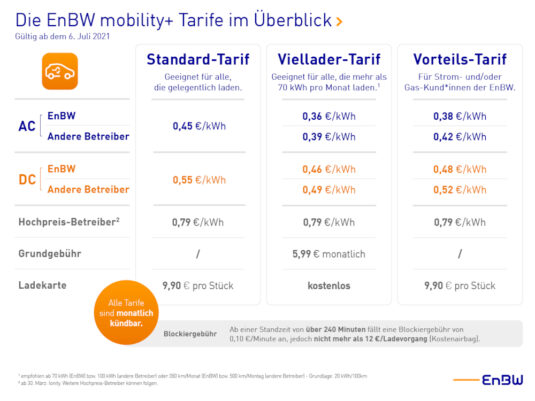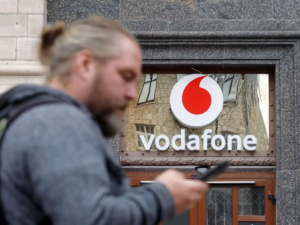Charging electric vehicles is turning out to be more costly with one of the main suppliers in Germany. Also, partially plainly. We’ll inform you every one of the insights about the cost increment got ready for July 6 at EnBW emobility +.

Chapter by chapter list
1 EnBW emobility +: It’s getting more costly and befuddling
The new costs in the standard levy
New costs in the multi-loader duty
The new costs in the markdown tax
2 Why is EnBW expanding its costs?
For some electric vehicle drivers, charging their vehicle will turn out to be more costly from July. Since from July sixth, EnBW will charge new costs for the utilization of EnBW portability +. Both when utilizing the application and when utilizing an appropriate charging card, you need to expect a cost increment. In Germany, EnBW portability + is one of the most well known applications for charging e-vehicles, on the grounds that the proposition dazzles with its basic value structure. Moreover, the costs each kilowatt hour (kWh) are very modest contrasted with different suppliers.
ENBW EMOBILITY +: IT’S GETTING MORE EXPENSIVE AND CONFUSING
Also, the uplifting news is: Even after the cost increment that has now been reported, EnBW portability + remains appealingly valued. In any case, there are sometimes solid cost increments. Since from July 6, not just the standard duty will be more costly, yet in addition the multi-loader tax. What’s more, the rebate duty, which is substantial for private clients of EnBW, will likewise cost more later on. What’s more, EnBW will separate between in-house charging stations and different administrators in the multi-charger levy and the rebate tax. Later on, a higher kWh cost will apply to these two duties at outsider charging stations.
The new costs in the standard levy
On the off chance that you just utilize an e-vehicle a little, the adaptable standard levy is the best decision for you. Beginning July sixth, you can charge AC charging stations for 45 pennies for each kWh without a fundamental expense. Up until now, 39 pennies were expected. It is quicker to DC – Ladesäulen. In the standard tax, 55 pennies for every kWh will be charged there rather than the recently charged 49 pennies. Special case: You even need to pay 79 pennies for each kWh at Ionity charging stations. Ionity is a supposed excessive cost administrator in EnBW’s HyperNetwork – different suppliers might follow.
New costs in the multi-loader duty
The conditions in the multi-loader levy change in more than one way. From one viewpoint, the kWh costs additionally increment here. Rather than 29 pennies (AC) or 39 pennies (DC), EnBW charging stations will in future have kWh costs of 36 (AC) and 46 pennies (DC), separately. At charging stations from different administrators, 39 or 49 pennies for every kWh charged are expected. Charging at Ionity charging stations likewise costs 79 pennies for each kWh in this duty.
To exacerbate the situation, EnBW is likewise turning the value screw somewhere else. Since notwithstanding the kWh costs, EnBW is likewise expanding the essential expense. From July sixth, it will be € 5.99 rather than the past € 4.99. That is the reason the multi-charger levy is just beneficial later on if you charge no less than 70 kWh each month. That far has effectively paid for itself with no less than 50 kWh each month. Not surprisingly, the multi-charger duty incorporates a NFC charging card for nothing. In the standard duty, a one-time charge of 9.90 euros is expected for the card.
The new costs in the rebate tax
In case you are an EnBW client and acquire power or gas in your private family from the energy goliath from Karlsruhe, you can utilize the standard duty at discounted costs. So you don’t pay an essential expense and you address somewhat lower kWh costs. Rather than the past 29 pennies for every kWh at AC and 39 pennies for each kWh at DC charging stations, later on the advantage duty will likewise separate between charging processes at EnBW charging focuses and charging stations of different administrators.
As such, charging at EnBW charging stations will be conceivable in the future for 38 pennies for every kWh (AC) or 48 pennies (DC). At the charging stations of different administrators, 42 pennies for each kWh (AC) or 52 pennies for every kWh (DC) are expected. This compares to cost increments of somewhere in the range of 23 and 45 percent. Charging at Ionity charging stations costs 79 pennies for each kWh as normal in the markdown duty.
Likewise essential to know: In all duties you pay a hindering expense of a dime each moment on the off chance that you re-energize your e-vehicle at a charging station for over four hours; covered to a limit of 12 euros.

WHY IS ENBW INCREASING ITS PRICES?
In an email to its clients, EnBW contends that the new costs are vital because of “dynamic expense improvements”. This essentially alludes to the expenses of extending the quick charging network. As of late, EnBW reported that it would fabricate the biggest accusing park of quick charging stations for e-vehicles in Europe at the Kamener Kreuz (A1/A2) . Furthermore, that is only a model. “We are contributing and assembling vigorously with the goal that we can offer drivers of electric vehicles the best charging foundation on German streets,” says EnBW chief Timo Sillober.


